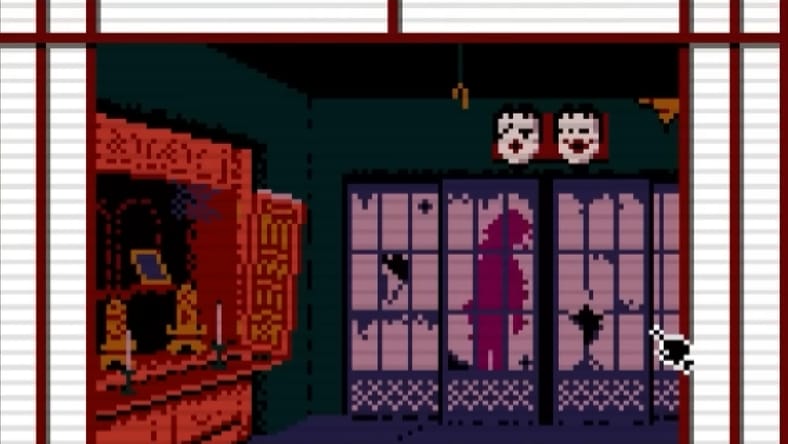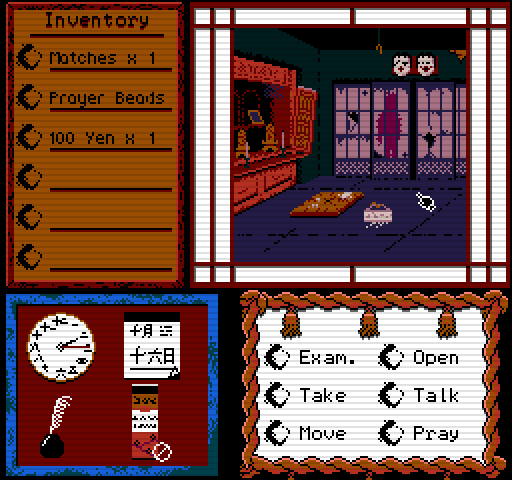Ultra-Indie Spotlight Sunday: Occult Case Files

Vanishing Point is the demo and first act of Teebowah Games’ latest title, Occult Case Files. While hunting for a paranormal entity known as “the Vanishing Point,” your friend has, not unexpectedly, gone and vanished. With few leads, you are forced to investigate a mysterious and abandoned house in the hopes of finding some evidence of your missing occult-secret-hunting friend. See if you can’t make it through a classic point & click horror

Conceptual Meta-Wank:
I once tried to play Elder Scrolls: Oblivion after I had already played Skyrim. Despite Oblivion being a classic and in many peoples’ opinion a more enjoyable game, I had already experienced mechanics like running and was never able to fully engage with the title. I get a bit of the same experience in Occult Case Files, in a good way. This is a game designed to feel like an early point & click adventure title, which is a bit before my time and thus takes me a little out of my gamer’s comfort zone.
I’m used to walking simulators where I can sprint around and click on items in a fully rendered 3d world. Occult Case Files has returned me to a time when I have little more than arrow keys and a ‘use’ button. There is no mouse cursor, no clear directions as to where to go, and rudimentary movement and interactions with the game. In short, for someone used to rapid responses from the horror game they’re playing, this is a frustrating and delightful blast from the past.
Non-Wanky Game Recap:
As previously stated, you get arrow keys and a use button. On the screen are your inventory and six selectable actions; examine, open, take, talk, move, and pray. Occult Case Files is about finding your way through an abandoned house. To do this you must talk to doors, pray to items you wish to collect, and open evil spirits that you may find.

What Works:
In addition to providing a style of game I am not used to, Occult Case Files creates an incredible atmosphere. The colors are vibrant and the audio design immaculate. The visuals are grimy from afar and gruesome up close. And the numerous interactions available make each room an interesting and less than straightforward puzzle On top of that, OCF could be an interesting start to a versatile platform of telling horror stories. Similarities could be drawn between this and World of Horror, which I have personally not played but am told is great.

What Doesn’t:
Not enough action, I think this would be best as a first-person looter-shooter. Perhaps some roguelite elements and featuring Dante from Devil May Cry. No, I jest. I can’t really think of anything Occult Case Files is lacking in. As with many demos, it leaves me wanting more, but that is, of course, by design.

How To Fix It:
The story told in this demo is a somewhat complete narrative arc as is, and I am interested to see whether or not it will continue along with this same character, or branch off into different occult cases. Perhaps Occult Case Files will do both. Either way, Teebowah is a personal favorite, and I fully trust their gameplay design choices.

Wanky Musings:
I was about to say it plays like a point & click Resident Evil, then I remembered I have it backward; Resident Evil is a point & click game turned into survival horror. After all, what other genre would place you in a police station with doors unlocked by statuettes and requiring you to solve riddles in order to unlock different areas? It really is remarkable how far the pointing and clicking have come. Occult Case Files is a return to a form that predates me personally, and I appreciate the challenge of stepping into this gamer time machine.
You can download the Occult Case Files demo by clicking here. And for the full catalog of Teebowah games, click here (I’m a big fan of their collaborative projects, Pit of Babel and PYLONS).
Categorized: Ultra-Indie Spotlight
